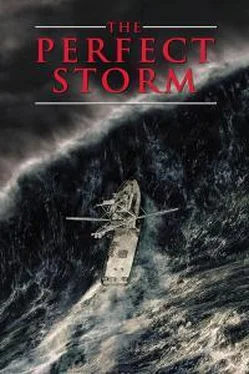Sebastian Junger - The Perfect Storm
Здесь есть возможность читать онлайн «Sebastian Junger - The Perfect Storm» — ознакомительный отрывок электронной книги совершенно бесплатно, а после прочтения отрывка купить полную версию. В некоторых случаях можно слушать аудио, скачать через торрент в формате fb2 и присутствует краткое содержание. Жанр: Триллер, Проза. Описание произведения, (предисловие) а так же отзывы посетителей доступны на портале библиотеки ЛибКат.
- Название:The Perfect Storm
- Автор:
- Жанр:
- Год:неизвестен
- ISBN:нет данных
- Рейтинг книги:3 / 5. Голосов: 1
-
Избранное:Добавить в избранное
- Отзывы:
-
Ваша оценка:
- 60
- 1
- 2
- 3
- 4
- 5
The Perfect Storm: краткое содержание, описание и аннотация
Предлагаем к чтению аннотацию, описание, краткое содержание или предисловие (зависит от того, что написал сам автор книги «The Perfect Storm»). Если вы не нашли необходимую информацию о книге — напишите в комментариях, мы постараемся отыскать её.
The Perfect Storm — читать онлайн ознакомительный отрывок
Ниже представлен текст книги, разбитый по страницам. Система сохранения места последней прочитанной страницы, позволяет с удобством читать онлайн бесплатно книгу «The Perfect Storm», без необходимости каждый раз заново искать на чём Вы остановились. Поставьте закладку, и сможете в любой момент перейти на страницу, на которой закончили чтение.
Интервал:
Закладка:
Unfortunately, the Rush was in even more trouble than the Tiffany Vance. She had cable on her birds instead of chains, and the broken cable managed to wrap itself around the drive shaft and freeze the propeller. The boat went dead in the water and immediately turned side-to in the waves— in "a beam sea," as it's called. A boat in a beam sea can count her future in hours, maybe minutes. Wayne Rushmore, her captain, got on the radio and told Bueno he was going down and needed help, but Bueno radioed back that he was going down, too. The Rush's crew went back out on deck and, taking extraordinary risks, managed to pull the cable free of the propeller. For the next several days the two boats rode the storm out side by side; at one point the sun came out, and Bueno noticed that the larger waves put his wheelhouse in shadow. They blocked out the sun.
BY ALL reports, Billy's having a terrible trip. After fourteen sets he only has about 20,000 pounds of fish in the hold, which is barely enough to cover expenses, much less compensate six men for a month of their life. When Linda Greenlaw arrives on the fishing grounds Billy tells her that he's disgusted and is going to need more fuel if they want to make any money at all. Sword boats lend each other supplies all the time on the high seas, but Billy has a particular reputation for pushing things to the limit. This is not the first time Linda has bailed him out. The two boats rendezvous south of the Flemish Cap, and Linda drops a tow line and refuelling hose over the side. Billy comes up bow to stern and ties off the tow line, and the boats chug along, the Hannah Boden pulling the Andrea Gail, while the fuel gets pumped into Billy's tanks. It's a dangerous maneuver—with any other boat, Bob Brown would insist that Linda just tie floats to fuel drums and drop them over the side—but sister ships are a different matter. They'll do almost anything to give themselves an edge over the rest of the fleet. When they're finished, Linda hauls her lines back and the two crews wave goodbye as the boats draw apart. Half an hour later they're just white squares on each other's radar screens. The fuel is just the beginning of Billy's problems, though.
Throughout the trip he's been having trouble getting the ice machine to work properly. Ordinarily it's supposed to pump out three tons of ice a day, but the compressor is malfunctioning and cannot even handle half that. Day by day, in other words, the quality of the fish is starting to drop; a loss of just fifty cents a pound would mean $20,000 off the value of the catch. That could only be offset by catching more fish, which in turn means staying out even longer. It's a classic cost-benefit dilemma that fishermen have agonized over for centuries.
And then there's the crew. They get ugly at about the same rate as badly iced fish. By the end of a long trip they may be picking fights with one another, hoarding food, ostracizing the new members—acting, in short, like men in prison, which in some ways they are. There are stories of sword boats coming into port with crew members manacled to their bunks or tied to the headstay with monofilament line. It's a kind of Darwinism that keeps the boats stocked with rough, belligerent men who have already established themselves in the hierarchy. Billy would never permit that sort of viciousness on his boat—the crew are all friends, more or less, and he intends to keep it that way—but he knows you can lock six men together for only so long before someone gets crazy. They've been at sea three weeks and are looking at a minimum of two more. If they're going to salvage anything from the trip, they've got to catch some fish in a hurry.
Billy keeps talking with the other captains, studying surface temperature charts, analyzing the water column with his Doppler. He's looking for that temperature discontinuity, that concentration of plankton, mackerel, and squid. In five good sets they could turn this trip around. He knows it. Ice or no ice, he's not going back in until they do.
BILLY TYNE has the only private room on the Andrea Gail, which is standard for the captain. On some boats the captain's quarters are upstairs behind the bridge, but Billy's is in a small room next to the head; it's about the size of a private sleeper on an Amtrak train. There's a seabag full of dirty clothes and a few photos taped to the wall. The photos are of his two daughters, Erica and Billie Jo. Seven years ago, when Billie Jo was born, Billy stayed home to take care of her while his wife worked. Billie Jo got used to having a father around and took it hard when he went back on the boat. Erica was born four years later and has never known anything different; as far as she's concerned, fathers are men who go away for weeks at a time and come home smelling of fish.
The rest of the crew are wedged into a dark little room across from the galley. The bunks are stacked along the inner wall and the starboard hull, and the floor is covered with the detritus that accumulates around young men—clothes, cassette tapes, beer cans, cigarettes, magazines. Along with the magazines are dozens of books, including a few ragged paperbacks by Dick Francis. Francis writes about horse racing, which seems to appeal to swordfishermen because it's another way to win or lose huge amounts of money. The books get passed around the fleet "at about four hundred miles an hour,” as one swordfisherman put it, and they've probably been to the Grand Banks more times than the men themselves. Most fishermen tape photos of their girlfriends to the wall, alongside pages ripped from Penthouse and Playboy, and the crew of the Andrea Gail are undoubtedly no different.
The galley is the largest room on the boat, other than the fish hold. At first glance it could almost be a kitchen in a house trailer: wood veneer, fluorescent panel lights, cheap wood cabinets. There's a four-burner gas stove, an industrial stainless steel refrigerator, and a Formica table angled into the forward wall. A bench runs along the length of the port side, and there's a single porthole above the bench. It's too small for a man to wiggle out of. A door at the aft end of the galley exits into a small holding area and a companionway that goes down into the engine room. The companionway is protected by a watertight door that screws down securely with four steel dogs. The fo'c'sle and pilothouse doors are watertight as well; in theory, the entire forward end of the boat can be sealed off, with the crew inside.
The engine, an eight-cylinder, 365-horsepower turbo-charged diesel, is slightly more powerful than the largest tractor-trailer rigs on the highway. The engine was refurbished in 1989 because the boat flooded at dock after a discharge pipe froze, cracking the weld. The engine drives a propeller shaft that runs through a cutout in the aft bulkhead of the compartment and through the fish hold to the stern of the boat. Most boats have a gasket that seals the prop as it passes through the bulkhead, but the Andrea Gail does not. This is a weak point; flooding in the fish hold could conceivably slosh forward and kill the engine, crippling the boat.
The machinery room sits just forward of the engine and is crammed with tools, spare parts, lumber, old clothes, a backup generator, and three bilge pumps. The job of the pumps is to lift water out of the hold faster than it comes in; in the old days crews would be at the hand pumps for days at a stretch, and ships went down when the storms outlasted the men. The tools are stored in metal lockboxes on the floor and include just about everything you'd need to rebuild the engine—vise grips, pry bar, hammer, crescent wrenches, pipe wrenches, socket wrenches, Allen wrenches, files, hacksaw, channel-lock pliers, bolt cutters, ball peen hammer. Spare parts are packed in cardboard boxes and stacked on wooden shelves: starter motor, cooling pump, alternator, hydraulic hoses and fittings, v-belts, jumper wires, fuses, hose clamps, gasket material, nuts and bolts, sheet metal, silicone rubber, plywood, screw gun, duct tape, lube oil, hydraulic oil, transmission oil, and fuel filters.
Читать дальшеИнтервал:
Закладка:
Похожие книги на «The Perfect Storm»
Представляем Вашему вниманию похожие книги на «The Perfect Storm» списком для выбора. Мы отобрали схожую по названию и смыслу литературу в надежде предоставить читателям больше вариантов отыскать новые, интересные, ещё непрочитанные произведения.
Обсуждение, отзывы о книге «The Perfect Storm» и просто собственные мнения читателей. Оставьте ваши комментарии, напишите, что Вы думаете о произведении, его смысле или главных героях. Укажите что конкретно понравилось, а что нет, и почему Вы так считаете.












